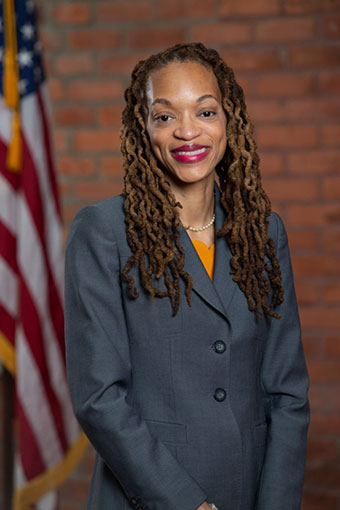She is a Nationally Recognized Expert in Sentencing Law & Procedure. An Exclusive Interview With Jelani Jefferson Exum Dean and Philip J. McElroy Professor of Law, At The University of Detroit Mercy School of Law.
 Q: Can you share with our audience your thoughts when you knew you were to be the first Black Dean at Detroit Mercy Law?
Q: Can you share with our audience your thoughts when you knew you were to be the first Black Dean at Detroit Mercy Law?
JJ: First, I should say that I am extremely honored to be the first Black dean at Detroit Mercy Law. And I am thankful for the path that was forged by our outgoing dean, Phyllis Crocker, who was the first woman to hold this position. Women and people of color are often left out of these sorts of leadership roles because our unique contributions historically have not been valued. I plan to approach this new role by always being open to the value that people of different backgrounds, religions, races, ethnicities, gender identities, and all other perspectives bring to the table so that I am playing my part in forging a path for a more diverse and representative legal profession.
Student success is a top priority - and a lot of my work will be focused on raising support for our bar preparation and academic support programs so that all of our students - regardless of their background - can be successful. Additionally, social justice is key to our Jesuit and Mercy traditions at Detroit Mercy Law, so one of my major goals is to deepen our connection to the Detroit so that we, as a law school, are instrumental in working toward legal and social equity in our own community.
Q: When did you realize you would rather teach instead of practice at a law firm?
JJ: I actually never wanted to practice at a law firm. When I was in law school, I knew that my heart was in public interest law, and I had my mind set on being a public defender because I wanted to ensure that people of all means were treated fairly in the criminal justice system. So, I never even entertained the idea of corporate law or being a plaintiff’s attorney at a law firm. But, when I was a judicial clerk after law school, the judges for whom I worked both encouraged me to consider academia because I was a strong researcher and writer and had an interest in legal reform.
Following my clerkships, I was a teaching Forrester Fellow for Legal Research and Writing at Tulane Law School and I loved it! It was so great to guide law students and to help them to see how they can actually have a hand in shaping the future of the law. After my clerkship I went on the teaching market and landed my first tenure-track job at the University of Kansas School of law, and I haven’t looked back since!
Q: Can you tell us about some of the topics you’ve written about?
JJ: I write about criminal sentencing and policing, with a focus on racial justice. I’ve spent most of my academic career as a sentencing scholar advocating for just and goal-oriented criminal punishment, and my work on policing has been informed by that sentencing perspective. In 2014, I was asked to give a TEDxToledo talk on the death penalty, and during the time that I was preparing that talk, Michael Brown was killed by a police officer in Ferguson, MO. I ended up delivering a TEDx talk that year called, "The Death Penalty on the Streets" in which I called for the same sort of human dignity approach that the law, at least theoretically, embraces in the death penalty context to be applied to our rules about policing. The death penalty is falling out of favor, and even in states that still hold on to it, the Constitution does not allow for death to be imposed arbitrarily, inhumanely, or when such a punishment would not be proportionate to the crime. However, the disproportionate use of police force against Black people exhibits all of those ills. After giving that talk, I began incorporating a focus on police reform into my work. But I come to it with the same questions that I ask in my research on punishment reform - what are we trying to accomplish through policing and how can we re-think policing in a way that recognizes the dignity of human life by developing rules designed to save lives, rather than using the law to protect the taking of those lives. In answering those questions, we have to confront the systemic consequences of decisions about policing on African American communities. My work in both sentencing and policing highlight systemic racial bias, and I try to offer new ways to think about the goals of our criminal justice system in order to alleviate the consequences of that bias.
Q: What do you enjoy most about your career as a Law Professor?
JJ: As a professor for the last 14 years, I have most enjoyed helping students to realize their place in shaping the law. In turn, each semester the students help me to imagine more and more ways to push for more justice and equity in the law. Students are a wonderful source of insight into the future of law.
I've taught at many institutions - the Tulane Law School, the University of Kansas School of Law, Michigan Law School, the University of Toledo College of Law, and Detroit Mercy Law - and at each school, I have had students who have pushed me to reimagine the promise of law. They have inspired my own research on punishment and policing reform through their questions, outrage, curiosity, and dreams. In fact, it was my desire to help build programs to help students to be successful change agents during and after law school that led me to pursue the position of Dean at Detroit Mercy Law.
Q: Why did you decide to go into law?
JJ: My interest in law is based in my desire to see people treated fairly. I remember being impacted by injustices I saw growing up in New Orleans. It was clear to me from an early age that people were treated differently based on their race and socio-economic status, and that never seemed fair to me. I saw studying law as a way to understand why things were that way and practicing law as a way to fight for people to be treated fairly despite their circumstances.
Q: Can you share with us some of the community work your involved in?
JJ: I chair the advisory board for the Neighborhood Defender Service (NDS) of Detroit, an organization that provides holistic criminal defense service to Wayne County residents. As Board Chair, I’m able to support the important work NDS Detroit does in the Detroit community to protect people from being needlessly lost in the criminal justice system. I also serve as the Foundation Chair for the Oakland County Chapter of Jack and Jill of America, a leadership organization formed in 1938 during the Great Depression by Black mothers with the idea of bringing together children in a social and cultural environment.
I also do much of my community service work as a member of the Oakland County chapter of The Links, Inc., one of the nation’s oldest and largest volunteer service organizations of Black women. We provide hands-on service, transformational programming and assistance in Oakland County, Michigan, focusing on the needs of families in the city of Pontiac.
Q: What’s one lesson you’ve learned in your career that you can share with our audience?
JJ: My career has taught me that mentorship is invaluable. Mentors have guided me every step of the way in my career and have pushed me to step out on paths that I had not even known were options for me. For instance, the judges that I clerked for encouraged me to consider academia and connected me to people who could guide me through the process of becoming a law professor when I had not even known to consider that as a career option. As a young law professor at the University of Kansas School of Law and then the University of Toledo College of Law, I gained friends who have acted as professional mentors and have remained in my life to this day, giving me advice and helping me to understand how to navigate the twists and turns of an academic career. The same is true for my path to becoming a law school dean. I’ve been incredibly fortunate to have mentors who, even when I didn’t necessarily see myself as a dean, they saw it in me and let me know that I have what it takes to do this job well. Because I know what mentorship has done for me, I make it a priority to act as a mentor to others. I know that my journey and experiences can open doors for others, especially women of color, and so I regularly offer my time to advise and encourage the next generation of lawyers.
I am joining a network of 28 Black women who are currently law school deans and many of them have had a hand in teaching me how to be a trailblazer and an effective mentor. It is a privilege for me to be a part of that number and to model for others what law leadership can look like, as so many of those women have done for me.
Q: What advice would you give to young women who want to succeed in the workplace?
JJ: I think it is important for women to show up as themselves. Women often feel pressure to conform to a certain model of professionalism – one that has largely been set by men. Sometimes this manifest in women feeling the need to tone themselves down or to express themselves in a way that won’t cause any discomfort to others. But my advice is to just be you – you add value to any space with your own unique voice and perspective. If you are animated and lively – then be that. When you recognize that other women are being held back because they aren’t conforming to some societal picture of what they should be, then speak up for them and protect them as much as your role allows. You can rise in the ranks on your job by keeping your head down and going along with the status quo, but that is not success. True success in the workplace is being authentically you and showing others that they add value to the workplace when they show up as their genuine selves. That is how we transform institutions to be more inclusive, diverse, and ultimately equitable.
Q: Can you tell us how you manage your work life balance?
JJ: I am a mother of three young children, ages 8, 6, and 3, and I try to manage work and life by keeping in mind that work is a part of my life, but my life is so much more than work. It is important to me to be present for my children – to participate in their school activities, to have playtime, to have dinner with them and put them to bed at night. So, I work as an unapologetic mother. What I mean by that is that I make it known at work that I am a mother – I mention my children and what I have going on with them when I’m teaching, when I’m presenting at conferences, and when I am in meetings.
I think it is important for work colleagues to understand that we all have lives beyond the office and that we should support one another in being our best whole selves. And so, I share when I haven’t gotten a full nights’ sleep because my youngest was awake all night. I build into my workday the flexibility that I need to attend to my children as necessary. I think this is especially important as a leader because it sets the tone for others to understand that our lies outside of work will be respected and that work can be done with excellence in ways that are respectful of people’s full lives.
Q: What would be the title of your autobiography?
JJ: “Mighty Victorious.” My first name, Jelani, means mighty. My middle name, Faizah, means victorious. I know that my parents were very thoughtful in the names that they selected for me and my four sisters, and I lean on my name as a source of inspiration. Jelani is actually a male name, and so I’ve always been grateful that my parents saw fit to give that name to a girl because, as my father would tell me, “Girls can be mighty, too.” And, even when I am afraid to fail, I remind myself that there is victory in just being myself.
Five Things About Jelani Jefferson
1. What's your favorite family tradition?
Opening presents together on Christmas morning. Even as adults with our own families, my sisters and parents still do this with all of the children (we kept it up on Zoom during the pandemic). I don’t care much about the presents, but I love the family time and the memories.
2. Among your friends, what are you best known for?
Being a peacemaker.
3. Are you a morning person or a night owl?
Night owl (someone please explain this to my early-rising daughter!)
4. Favorite City?
New Orleans - my hometown!! There are things about Detroit that remind me of New Orleans, but I’ve still got to give New Orleans the top spot.
5. Cake or pie?
Cake! (Well, unless it’s sweet potato pie


